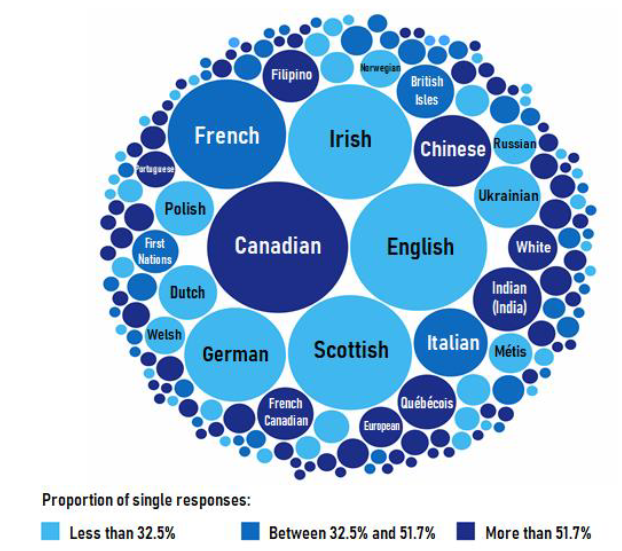Migration and Diversity
This data case study text is an abridged excerpt from The Canadian census: A rich portrait of the country’s religious and ethnocultural diversity published in 2022 by Statistics Canada.
Canada is renowned for its ethnocultural and religious diversity, a value embraced by most Canadians. The 2020 General Social Survey found that 92% of people aged 15 and older see ethnic or cultural diversity as a Canadian value. Statistics Canada’s 2021 Census reported over 450 ethnic or cultural origins. “Canadian” was the most common origin (15.6%), followed by origins from the British Isles, such as “English” (5.3 million), “Irish” (4.4 million), and “Scottish” (4.4 million). “French” and “French Canadian” origins were also significant. Other major origins included “German,” “Italian,” “Ukrainian,” “Chinese,” and “Indian,” each with over 1 million people. Approximately 2.2 million people (6.1% of the population) reported Indigenous ancestry.
Figure 2. Most common ethnic or cultural origins reported by the population, Canada, 2021

Note: the size of the bubble is in proportion to the number of total responses for a given ethnic or cultural origin. The colour of the bubble represents the proportion of single responses for a given ethnicor cultural origin grouped into tertiles. Source: Canadian Census of Population, 2021.
The census identified that over 19.3 million Canadians (53.3%) reported a Christian religion in 2021, a decline from previous years. The proportion of Canadians with no religious affiliation increased significantly, from 16.5% in 2001 to 34.6% in 2021. Immigration plays a key role in the diversity of religious affiliations, with immigrants making up the majority of Buddhists, Muslims, Hindus, and Sikhs. A significant proportion of recent immigrants reported non-Christian religions, contributing to the overall diversity.
Figure 3. In 20 years, the proportions of the population who reported being Muslim, Hindu or Sikh have doubled

Source: Census of Population, 2001 and 2021 (3901), and National Household Survey, 2011 (5178).
In summary, Canada’s diverse landscape is shaped by its wide range of ethnic, cultural, and religious backgrounds, significantly influenced by immigration and evolving over time.
According to the text, Statistics Canada’s 2021 Census reported over ethnic or cultural origins. \“Canadian\” was the most common origin (%), followed by origins from the British Isles, such as “English” ( million), “Irish” ( million), and “Scottish” ( million). “French” and “French Canadian” origins were also significant. Other major origins included “German,” “Italian,” “Ukrainian,” “Chinese,” and “Indian,” each with over million people.
What was the proportion of Canadians reporting a Christian religion in 2021, and how has this changed from previous years?
Name three non-Christian religions that saw growth in Canada according to the 2021 Census. What role does immigration play in the diversity of religious affiliations in Canada?